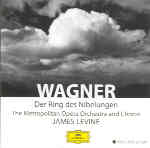DG reissues its late-1980s Levine/Met Ring cycle as a budget-priced, space-saving boxed set, providing serious competition for similarly packaged editions of Wagner’s Der Ring des Nibelungen from Philips and EMI. For starters, Levine’s Ring largely benefits from modern-day studio recording and its myriad advantages, without the stage noises or errors of execution and balance that occasionally occur in the live Böhm (Philips) and Sawallisch (EMI) Rings. More importantly, the present Ring attests to the high level of ensemble sophistication, flexibility, and polish the Met Orchestra had developed over the years under Levine’s music directorship. Listen, for example, to the incandescent grandeur and careful detail characterizing the Entrance of the Gods into Valhalla and Siegfried’s Funeral March, or the full-throated intensity with which Die Walküre’s three preludes and the Siegfried third-act prelude set up the ensuing drama. By contrast, Levine brings an almost Mozartean lightness and point to Das Rheingold Scene 2’s quick-witted negotiations between Wotan, Loge, and the giants Fasolt and Fafner. In Siegfried, the same can be said for Levine’s incisive, playful shaping of the comical bickering between the protaganost and Mime.
It’s one thing to claim that the state of Wagner singing in the late 1980s fell far short of what opera audiences experienced in the ’50s and ’60s, and it’s quite another to prove it. Granted, Hildegarde Behrens (Brünnhilde) and Reiner Goldberg (Siegfried) don’t possess the steadiest top ranges in the business, but their respective timbres certainly match the roles they portray. Matti Salminen’s imposing vocal presence brings out every inch of Hagen’s scheming, evil nature, although Jessye Norman’s deep-dish, ravishingly sung Sieglinde is far removed from the character’s youth and vulnerability. Christa Ludwig sounds no less fresh and commanding in Fricka’s music as she did two decades earlier in Solti’s Ring. Then there’s James Morris, whose Wotan and Wanderer set new standards in these complex, multi-dimensional roles, just as Schorr and Hotter did in their respective heydays. A full synopsis of each opera is included, but no texts or translations. In all, cost-aware Ring shoppers should give this set serious consideration. [12/7/2002]
































